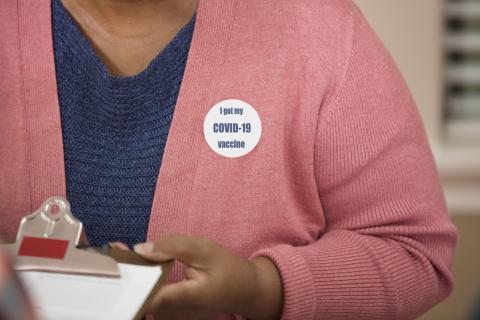I Got My Vaccine! What Can I Do Now?
For one thing, you aren’t “fully vaccinated” after that first shot. You can’t walk out of the facility and throw your mask in the air! “Remember that COVID vaccination is a journey,” say epidemiologists from the University of Michigan (U-M). Your body won’t be ready to fight the coronavirus until two weeks after your second dose of the Moderna or Pfizer vaccine, or the single dose of the Johnson & Johnson type. Don’t let up on precautions just yet.
Once the two weeks are up, and you’re officially fully vaccinated, congratulations! “You can do some pre-pandemic activities again, but not everything, yet,” say the U-M experts. They recommend a “go slow” approach to change your habits. “Being vaccinated does not mean that the pandemic is over. It isn’t,” says Dr. Laraine Washer, medical director of infection prevention and epidemiology for Michigan Medicine. “Being vaccinated does mean that you can begin to engage in limited low-risk activities without a mask, such as visiting with a vaccinated friend or two—as long as that friend does not live with people who are at high risk of severe COVID infection and not yet vaccinated.”
Being fully vaccinated also means relaxed quarantine requirements. Unvaccinated people should stay completely home for 10 to 14 days if they are exposed to a person with COVID-19. “But not you!” say the U-M experts. “If you’re vaccinated, and you haven’t developed symptoms, you’re good to go.”
For now, the verdict is still out on how effective the vaccine will be in totally protecting against infection. The situation might be similar to what we experience with the seasonal flu, where a few vaccinated people get a “breakthrough” infection, likely a much milder case than if they hadn’t been vaccinated. It’s also possible that vaccinated people could spread the virus without having any symptoms themselves. We should know more about that as research continues.
Meanwhile, continue to protect yourself and others. “Currently, being vaccinated should not change your behavior in public,” says U-M epidemiologist Amanda Valyko, M.P. H. “You may be interacting with a variety of people that are not yet vaccinated or even not complying with the mask or distancing recommendations. With a large amount of COVID-19 circulating, continue to mask and distance in public to reduce your risk of infection.”
What about travel? The U-M team says those recommendations, too, are a work in progress, and they recommend keeping an eye on the Centers for Disease Control and Prevention (CDC) recommendations for any updates. You can find that information here. As of now, the CDC says that fully vaccinated people can travel at low risk to themselves within the United States, but should continue to wear a mask on any form of public transit.
So we’re all in this together—and there’s one more way you can help once you’ve got your vaccines. You probably know that social media and people with an agenda have spread false stories about the vaccine. Maybe you even know people who say they won’t get it. They’ve heard the outlandish rumors, and they say they don’t know who to trust.
In fact, they might well trust you! Getting vaccinated is something to brag about! “The word of a friend, relative or neighbor carries more weight with some people than the voices of hundreds of national experts with degrees after their names,” say the U-M experts. “By sharing your experience with people you know, and helping them get solid information, you can make a real difference in the total vaccination effort.”
There’s one more way you can help your friends and loved ones. It can still be challenging to find a vaccine in some areas. Share information about how you did it, and offer to help them. Offer a ride if they need it. It’s certainly worth the effort. Vaccination not only saves lives—it’s also the only way we’re going to get back to normal.
